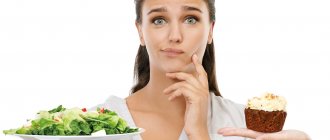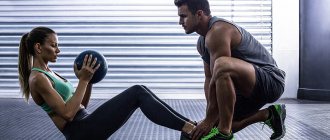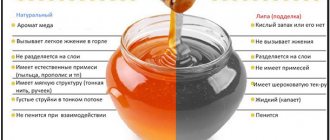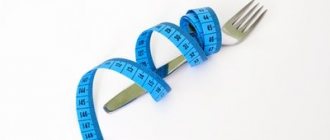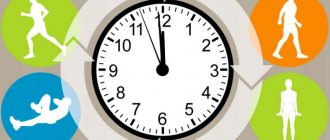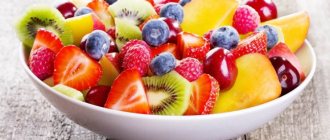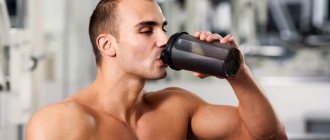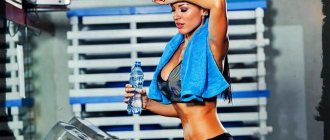Why you shouldn't run after eating
Bloating and discomfort appear in the abdomen
Digestion is a chemical and mechanical process. First, you chew, preferably slowly, to sufficiently chop the food, and at this time the necessary enzymes are already released in the stomach.
If you don’t have time to pause between meals and training, then most likely you eat quickly, without having time to chew thoroughly and without giving your gastrointestinal tract the opportunity to effectively digest food and absorb all the necessary substances. This results in bloating, constipation or indigestion. For some, this happens already during training.
The functioning of the gastrointestinal tract is disrupted
During running, blood flow accelerates - it rushes to the working muscles to deliver oxygen and nutrients to them. At the same time, it continues to saturate the internal organs as usual.
During meals, additional blood volume must flow to the gastrointestinal tract. And then it turns out that the muscles and the digestive system compete for their portion of blood.
By the way, there is a version that it is for this reason that cramps can occur - the muscles do not have enough nutrients, which should be supplied to the blood in time.
Stomach problems while running: why they occur and how to avoid them
The effect of training decreases
This point follows from the previous one. In normal life, supplying muscles accounts for 15-20% of the total blood volume in the body. During training, this figure increases several times. But if you ate a hearty meal and immediately went running, your muscles will not receive the required volume of blood along with oxygen and nutrients, which means they will not respond to the load.
Training plans for marathon and half marathon. and start preparing today.
As a result, the effect of the training will be lower than planned. Moreover, when you are full, insulin and serotonin are produced, which will put you into a relaxed, sleepy state.
Heartburn begins
After swallowing, food enters the esophagus, which is a kind of extension of the throat and connects it to the stomach. From the esophagus, food moves to the stomach, passing through the sphincter, which protects the esophagus from the entry of aggressive contents from the stomach.
When running, stomach acids can back up into the esophagus, causing heartburn and belching. The same thing happens if you bend over or do abs exercises after eating.
Is it better to run before eating or after a while?
If you are wondering how long after eating you can run, we will answer - at least an hour. In the case of a hearty lunch, it is better to wait for all two.
Why?
- It’s trite, but it’s harder to run with a full stomach.
- During the digestion of food, blood flows to smooth muscles (for example, the digestive organs). During running, blood flows more to the striated muscles. As a result, if you start running immediately after eating, the body will experience a “split”, and as a result, all the benefits from the food eaten and physical activity can be nullified.
A fair question arises: should you run before or after meals, because according to the previous logic, the main thing is that the stomach is empty.
However, running on an empty stomach is also not recommended, because in this case you simply will not have the strength. Can you imagine how much energy a person spends while jogging? Even if such training is planned, it should be shorter in time and lower in intensity.
By the way, you can run on an empty stomach if your goal is to lose weight. The body, which has not received a dose of glucose and protein from food, will quickly begin to draw strength from previously accumulated glycogens, and then from fats. However, how long you can withstand training at this pace is unknown. You will most likely quickly become disillusioned with this practice. Well, it’s clear that you won’t lose weight.
Food digestion time table
To make it easier to navigate, it’s worth dividing all products into:
- Easily digestible - fast carbohydrates that take up to an hour to digest: fruits, juices, berries.
- Moderately digestible - slow carbohydrates and vegetable fats, digested in 2-3 hours: vegetables, herbs, cereals, bread, cereals, pasta, bananas, dried fruits, milk, avocados.
- Difficult to digest - proteins and animal fats that take more than 3 hours to digest: meat, eggs, fish, seafood, legumes, nuts, seeds, hard cheese, mushrooms.
Sausages, canned food, alcohol, tea, coffee, fast food, baked goods made from white flour, sugar, candies, and chocolate are poorly digestible.
There is an opinion that breakfast is digested faster than lunch. But it is not exactly. Moreover, there are studies with the opposite result, convincing that metabolism accelerates only towards lunch.
Low-Intensity Runner's Diet
With this type of training, there is no need to organize a separate diet. When running at 50% of HR Max (maximum heart rate), the muscles have time to extract energy from the fat layer. Therefore, there is no need for additional energy sources in the form of fast carbohydrates.
Pay more attention to your drinking regime. Not everyone knows that the feeling of heaviness in the legs primarily indicates dehydration of the body. Before starting your workout, make sure that your body is provided with sufficient water. Look at the color of your urine. If it is straw yellow, the fluid level is normal. A darker color indicates a lack of fluid and possible dehydration.
Carbonated drinks and drinks containing caffeine will not help solve the problem of dehydration. Give preference to pure still water or sugar-free squash. 2 hours before the start of your workout, drink a non-nutritive drink in the amount of 3-5 ml/kg BW. You can drink while running, but no more than 200 ml of liquid for every 20 minutes of the race.
If you are preparing for a low-intensity workout, limit your intake of high-sugar foods half an hour to an hour before the start. 30 minutes after entering the body, glucose begins to be stored in the liver in the form of glycogen. As a result, under the influence of insulin, blood glucose levels will naturally decrease. That is, in fact, within an hour, glycogen from the liver does not flow directly to the working muscles, which leads to a decrease in the intensity of work.
On jogging days, the maximum daily requirement for carbohydrates is 3 g/kg BW. Proteins can be consumed 3-4 times a day at 0.25 g/kg BW. Below is a nutrition plan that looks at training options at different times of the day depending on the runner's preferences.
Approximate nutrition plan for a 60-minute LIT (Low Intensity Training)
| Morning workout on an empty stomach | Workout after breakfast | Afternoon workout | Rest days | |
| Breakfast | smoothie with banana and almonds | muesli with blueberries | seasonal fruit smoothie | oatmeal with cinnamon and apple |
| Dinner | beetroot, potato and feta salad | pumpkin cutlets, a piece of smoked cod, green salad with kefir | chickpea soup with cabbage | vegetable salad, omelette with feta cheese and zucchini |
| Afternoon snack | toast with nut butter, apple | 2 oatcakes | a handful of berries, 10-15 pieces of roasted almonds | Fruit skewers with mint |
| Dinner | chicken casseroles, baked fruit | vegetable lasagna, fruit puree | casserole, sausages, cocoa or hot chocolate | baked sea fish fillet |
What can you eat 30 minutes before training?
For an effective workout, the body needs energy, and it is best to get it from carbohydrates (about 70% of the portion before training), because they reduce fatigue and increase endurance. These should be foods with a low or medium glycemic index, that is, slow carbohydrates: durum wheat pasta, cereals, oatmeal, potatoes. You can add proteins to them and eat it all 1.5-2 hours before training.
If you don’t have that much time, then half an hour before training you should have a snack with carbohydrates with a high glycemic index, that is, foods that are quickly absorbed and provide the required amount of energy. The simplest options are a banana, fruit juice, muesli, toast with peanut butter or jam.
What foods are desirable and what should you avoid?
Meals before training, including before jogging, should consist primarily of carbohydrates with a low content of coarse fiber. Otherwise, food may cause colic, bloating, nausea and other unpleasant sensations. Fat and protein intake before a run should also be kept to a minimum.
To replenish energy before a run, the best foods to consume are honey, berry jelly, bananas, dried fruits, buckwheat or oatmeal, freshly squeezed fruit juices and cocoa.
What to do if you didn’t have time to have a snack before training
First you need to remember what the task is before you and what kind of training it is. If the goal is to lose weight, and you have no more than 30 minutes to jog, then you can do it on an empty stomach. A number of studies confirm that light training on an empty stomach is more beneficial for burning fat tissue than training after eating. The main thing is, don’t forget about water - a glass “before” is a must.
If there is grueling running work ahead, a snack is necessary. Alternatively, it could be a small portion of some fruit, an energy bar, a couple of spoons of honey, sweet tea or coffee, a gainer, or a smoothie.
Is it allowed to train on an empty stomach?
Running on an empty stomach is possible, but taking into account the individual characteristics of each person and the physical fitness of his body.
For example, for people prone to obesity, running before meals is even beneficial , since their body gets used to such stress and speeds up the metabolic process, automatically burning fat.
For such people, jogging on an empty stomach helps remove toxins from the body and improve the functioning of the cardiovascular system. But this applies mainly to morning runs, which should be of moderate intensity and last no more than 1 hour.
However, running on an empty stomach is not recommended for people with gastrointestinal problems , stomach ulcers and other health problems. In this case, it is recommended to refresh yourself with at least a fruit drink and only then go for a run.
What foods should you avoid before training?
Fatty and fried
It will be hardest for you to run after a heavy meal of fatty food, because it takes a long time to digest and interferes with the absorption of proteins and carbohydrates. Eliminate fried, fatty meats and cheeses from your pre-workout menu. Do not go heavy on vegetable fats such as avocado and nuts, as they also take a long time to digest.
Spicy and salty
Spicy food really speeds up metabolism, but at the same time it increases sweating and causes heartburn. And salty absorbs water, thickens the blood and complicates the transport of oxygen to the muscles. Therefore, it is better to forget about sausages, sausages, smoked meats and salty snacks, by the way, and not only before training.
High-fiber legumes and vegetables
All this is very useful, but before training it can cause bloating and heaviness.
Fast food
You will fill your stomach with it, but you will not receive the nutrients necessary for training. If you really want it, treat yourself to it after your workout. But not often.
Store-bought sauces
Do not top up your pre-run meals with sauces and mayonnaise, as they are high in fat, sugar and flavorings, which is again nothing good for productivity.
Alcohol
Just in case, we remind you that alcoholic drinks are high in calories and lead to uncoordination of movements and dehydration.
Symptoms that occur due to improper diet
Let's move from the theoretical part to real life. What symptoms occur with dietary errors?
Heartburn
If while running you experience a burning sensation, pain along the esophagus + a sour taste in your mouth, this is heartburn.
This is how it arises. The stomach is full of food, trying to digest it with a large amount of hydrochloric acid. Physical activity causes the abdominal muscles and diaphragm to contract. In addition, the body shakes while running. As a result, the contents of the stomach, along with hydrochloric acid, are thrown back into the esophagus through the lower esophageal sphincter!
The esophageal mucosa is not at all adapted to hydrochloric acid. The person experiences a burning sensation, nausea, and discomfort. If this situation is repeated frequently, various diseases can arise: GERD, Barrett's esophagus, caries, stomatitis.
The reason for all these pathologies is the same - training too early after eating.
Nausea, vomiting
The mechanism of nausea and vomiting during running is the same as with heartburn. The muscles hitting the ground literally push the food back out of the overfilled stomach. A reflux of bile into the stomach may occur.
In addition, you probably know the expression “your stomach is up” - we are talking about impaired motor skills. During running, blood is directed mostly to the periphery.
The stomach, which is actively working after a heavy lunch, receives less blood supply . His work becomes difficult, the muscle layer of the stomach does not contract, and motility is impaired. Hence the nausea and bloating.
Bloating
Another reason for bloating is an incorrect diet.
How to compose it correctly? Before running, avoid foods that increase gas production. These are legumes (beans, peas), cabbage, fruits + vegetables with a high fiber content, carbonated drinks. Running triggers motor skills, and with increased gas formation this causes pain. The blood supply to the intestines is reduced, so defoaming + gas removal occurs more slowly.
Pain, cramps
The localization of pain may vary.
| # | On right | In the middle | Left |
| Upper sections | Liver overflowing with blood - slow down. | Full stomach - early jogging. Or diaphragm spasm due to lack of oxygen - slow down. | Spleen overflowing with blood - slow down. If the splenic flexure of the intestine is full of gases - improper nutrition. |
| Middle departments | Increased gas formation or spasm in the large intestine. Wrong diet. | Bloating and cramping in the small intestine. Wrong diet. | Increased gas formation or spasm in the large intestine. Wrong diet. |
| Lower sections | Increased gas formation or spasm in the large intestine. Wrong diet. Possible gynecological problems in women | Intestinal bloating due to poor diet. Gynecological problems in women. | Increased gas formation or spasm in the large intestine. Wrong diet. Possible gynecological problems in women |
Below we will look at how long you can run to avoid pain.
Muscle cramps
We have already mentioned that the digestive tract suffers from a lack of blood circulation during running, as blood rushes to the muscles. But nevertheless, food must be digested.
The stomach and muscles have to start “fighting” for blood supply.
Under conditions of increased stress due to the work of the gastrointestinal tract, the muscles lack oxygen. Convulsions occur. Most often this affects the calf muscles.
Decrease in training productivity
Productivity drops for exactly the same reason. The struggle for blood supply, energy consumption for digesting food, discomfort - all this is the reason for low productivity during training. You need to exercise a certain time after eating. Let's finally find out - when exactly?
Simple rules for eating before running
- After a full meal, wait at least 1.5 hours.
- Do not eat fatty, fried, salty, spicy foods 4-5 hours before training.
- The pre-workout meal should consist of 2/3 slow carbohydrates and 1/3 protein.
- 15-30 minutes before training, you can eat fast carbohydrates in the form of a fruit smoothie, banana, or drink freshly squeezed juice.
- Drink water before and during your run if it lasts more than an hour.
Read on the topic: What to eat before starting a marathon and half-marathon Running on an empty stomach: is it possible to train on an empty stomach
Evening jogging
Many people choose to go jogging in the evening. They help relieve stress after a working day, promote stress relief and good sleep. And food after a run and before it is also very important in this case, because if you are tired and hungry, you will not be able to exercise productively. Quite often, a person returns from a run incredibly hungry and eats everything, which leads to problems with sleep and a lack of effectiveness of runs.
In this case, it is important to adhere to the following recommendations:
- Maintain proper nutrition throughout the day. Eat food often and in small portions - then in the evening you will not feel very hungry.
- You can eat in the evening, but not heavy food, which is stored in fat and causes insomnia.
Also, those who are used to running in the evening are advised to adhere to the following tips:
- Be sure to have breakfast - this is the most important meal of the day. For breakfast you can eat toast, cereal with nuts, berries, low-fat milk, juices and yoghurts.
- Lunch is also important. Eat lean protein meals. Various cocktails of milk drinks, fruits and berries will also be useful in your diet.
- A few hours before your run, you can eat some fruit or an energy bar.
- Dinner should be light. Proper consumption of food in the evening will not lead to fat, but will contribute to the restoration of muscle tissue. The ideal option is something protein and vegetables, fermented milk drinks.
When thinking about what you eat after a run and before a run, keep fluids in mind.
Drink enough water throughout the day to help control your appetite. Drink a couple of glasses of water 15-20 minutes before your run and a glass after it. How long after eating can you play sports or run in the evening? The optimal period is about an hour. But it is also important to focus on your body. Don't overeat, but don't let it deplete either. It's better to eat something light than to starve yourself. To restore energy, you can use special bars or gels. If you run long distances, your sports nutrition should include at least 50 grams of carbohydrate foods. Consume them after every hour of intense jogging. Special sports supplements can be replaced with healthy sweets - marmalade or dried fruits. They can be used as a quick snack during the day.
Nutrition after running
Post-workout nutrition is designed to restore carbohydrate reserves in the body. This is due to the fact that for an hour after running, the body tries to replenish the reserves of a substance such as glycogen. This substance is consumed during jogging.
Immediately after finishing the workout, eating is strictly prohibited, because the activity of the digestive system is significantly reduced. In order to reduce the feeling of hunger and thirst, you need to drink about 300 ml of natural juice. The following nectars are perfect: apple, tomato and orange.
Half an hour after training, you can start eating. It is best if it is oatmeal, semolina or wheat porridge with honey, as they contain the ideal ratio of protein and carbohydrates.
For runners who prefer sports nutrition, it is recommended to replace the juice with a complex containing amino acids. This will help relieve you of thirst and restore the required amount of carbohydrate reserves in the body. After half an hour, you need to drink 0.5 liters of the antioxidant complex. It will help restore muscle activity. After an hour has passed since the end of the workout, it is time to replenish the body with carbohydrates and proteins. To do this, you can eat bars, dry mixes or protein shakes.
If your workout takes place in the evening, be sure to have dinner one and a half to two hours before your run. You should exclude from your diet:
- fried food;
- grains and legumes;
- fat meat;
- flour products.
After an evening jog, it is recommended to replenish your carbohydrate supply within an hour, just like in the morning. If the feeling of hunger does not leave you, after a while you can allow yourself fruit or juice, but in moderation.
Be sure to remember that the distribution of nutrition during running training is not only the key to a successful workout, but also maximum benefit for the body. Unfortunately, not every person involved in sports understands how much harm training can cause to health if you eat improperly.
Is it possible to eat after an evening workout?
The answer to this question is obvious: eating after an evening workout is not only possible, but also necessary. Why? There are a number of objective reasons for this:
- Any physical activity, especially sports training, entails a large expenditure of energy. Energy reserves expended during exercise must be replenished, otherwise the body will regard this situation as starvation and will begin to actively store food, forming fat deposits.
- After intense evening workouts, the body needs not only to replenish expended energy, but also to restore muscles.
Both of these reasons are relevant both for those who want to gain weight and for those who want to lose weight.
When starting to exercise in the gym, it is important to understand: fasting will in no way contribute to weight loss, just as overeating will in no case provide you with an increase in muscle mass. Only a balanced diet and optimal balance of nutrients will help keep your body in great shape.
Basic Rules
As with everything related to fruitful sports activities, it is important to strictly follow certain rules in nutrition after evening workouts:
- Before, during and immediately after training, you can drink only plain drinking non-carbonated water, in unlimited quantities, but in small portions - during intense exercise, liquid is removed from the body in large quantities, and dehydration, as is known, negatively affects the functioning of all organs and body systems.
- You should not organize a meal immediately after leaving the gym. After the final part of the workout (cool-down), the body needs some time to rest and relax: do not forget - digesting food also requires some effort.
- After training, it is recommended to take a refreshing shower, change clothes and then, 20-30 minutes after the end of the lesson, eat.
- Food intake should be complete in terms of the content of nutrients, and not in terms of the volume of food eaten. The rule “the more the better” does not work here. Firstly, the body is tired and digesting a large amount of food will not benefit it. Secondly, excess proteins, fats and carbohydrates will invariably be deposited in the form of unwanted centimeters in problem areas, which will make the workout not just ineffective, but simply useless.
As you know, there are exceptions to any rule. If after a full workout you are cheerful and full of vital energy, and there is no feeling of hunger at all, you should not force feed your body.
In this case, it is enough to drink a glass of freshly squeezed juice or snack on a juicy fruit on the way home.
What to eat after training in the evening?
After an active and fruitful workout, a feeling of satisfaction invariably comes and so-called pleasant fatigue gradually sets in. In this state, you don’t always want to cook yourself a full, balanced dinner. But you still need to eat after class. In fact, an evening meal will not require much effort from you - after all, there are many options for healthy and tasty food, the preparation of which will not take much time and effort.
It is important to understand that after training you should eat only healthy foods for dinner - any sweets, fatty, spicy, salty foods are excluded. How to create an evening menu? Here are the basic rules:
- Protein
. This is the main component of muscle tissue; it is proteins that are responsible for proper metabolism in the body, protect cells from harmful and dangerous substances, determine the functioning of the immune system, transport useful substances to cells (for example, hemoglobin - supplies oxygen to cells). Proteins consist of amino acids, which are replaceable (can be synthesized by the body independently) and essential (the body can receive them only from external sources - from food). Protein is found in lean meat, chicken, chicken protein, cottage cheese, lean fish, liver, and there is a lot of protein in buckwheat, Brussels sprouts, and cheese. - Carbohydrates
. This is the raw material for energy production in the body. Carbohydrates are fast and slow. Fast ones are absorbed instantly, almost instantly provide saturation due to the release of a large amount of sugar into the blood, but this effect does not last very long, soon the feeling of hunger sets in again (this includes sweets, baked goods, processed cereals, sweet fruits, etc.). Slow carbohydrates work much longer - they are digested for a long time (the feeling of hunger disappears after 20-30 minutes), thereby ensuring longer saturation (you don’t feel like eating for 3-4 hours). Slow carbohydrates include vegetables, whole grain bread, naturally-coated cereals, greens - all foods that contain large amounts of fiber.
For weight loss
If you go to the gym in order to get rid of extra pounds and centimeters, in no case neglect a proper dinner:
- 70% of the serving should be proteins, 30% carbohydrates. It is better to avoid fats for dinner, trying to include them in your morning and afternoon menu in the quantities necessary for the body.
- You can eat low-fat cottage cheese with fruit puree or oven-baked chicken breast with vegetables.
- It is advisable to give preference to slow carbohydrates - buckwheat, raw or steamed vegetables, baked fish with vegetables, low-fat cottage cheese, vegetable salad without oil dressing. At the same time, you shouldn’t completely give up slow carbohydrates - you can drink a glass of tea with a spoonful of honey, eat a piece of fruit.
These rules are relevant for both boys and girls who want to lose weight.
If you want to lose weight, then you should carefully review your entire diet: eat 5-6 times a day in small portions (300-400 kcal), drink as much water as possible.
For weight gain
It is a well-known fact that losing weight is always easier than gaining muscle mass. Accordingly, in this case, your diet needs to be planned more carefully:
- 30% of the serving should be proteins, 70% carbohydrates. Carbohydrates are needed to replenish expended energy, and protein will be used to build new muscle cells.
- The optimal evening menu is porridge (buckwheat, pearl barley, oatmeal, brown rice) or durum wheat pasta as a side dish and chicken breast or baked veal steak or lean fish, boiled chicken egg.
- Fats, as in the case of losing weight, should be relegated to the background - the body has great difficulty coping with their breakdown, and to make the task easier for itself, it begins to process nutrients from the muscles.
It is important to prevent muscle starvation - in this case, the process of their destruction invariably begins. In order to get ahead of the feeling of hunger, you can immediately after training eat something from fast carbohydrates and easily digestible proteins.
For drying
Drying is the process of burning fat. As you know, it is fats that take the longest to be absorbed by our body. Accordingly, to break them down, you need to develop a certain training regimen and, of course, nutrition:
- To speed up metabolism, we maximize the volume of water consumed per day (from 2.5-3 liters and above).
- We increase the amount of protein consumed after training, and don’t forget about sports nutrition and amino acids.
- In order to give the body the right amount of energy, before training (an hour and a half before) you can eat a small portion of slow carbohydrates (porridge, whole grain bread, vegetables).
In the evening menu after an evening workout, you can include low-fat cottage cheese or unsweetened yogurt, low-fat veal or chicken (steamed), and the white of one chicken egg.
It is important to understand that the drying procedure cannot last long - after all, the body cannot do without carbohydrates for a long time. This is why it is very important to start and finish the fat burning process correctly.
